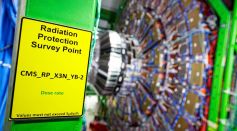Tags: Large Hadron Collider

World's Biggest Particle Accelerator: CERN Proposes $17 Billion 'Future Circular Collider' That Is 91 Kilometers Long

Recent Search of Dark Matter Ends Empty-Handed, Unveiling Limits and Charting New Paths for Discovery
What's the Large Hadron Collider?

Neutrinos Created by a Particle Collider at CERN for the First Time, Deepening Understanding of Their Role in the Universe

Large Hadron Collider Faces New Challenge in Physics 10 Years After Higgs Boson Discovery

For the First Time Large Hadron Collider FASER Experiment Reveals Ghost Particle Neutrinos
Generating Antimatter by High-Intensity Lasers Possible by Producing Plasma-Level Energy Similar to Neutron Star

Newtonian Fluid: The Perfect Liquid, Earliest State of Matter in the Universe
Dark Matter Origin Still a Mystery: Is It More Than a Cosmic Anomaly?
CERN Scientists Discover Four New Elementary Particles
Research on a Grand Scale: Over 5,000 Scientists Come Together for Record-Breaking Publication
CERN Scientists Discover the Force
Large Hadron Collider Could Prove the Existence of Star Trek's Parallel Universe
Large Hadron Collider Upgrades Are Complete as Researchers Gear Up for 2015
Large Hadron Collider Prepped & Prepared for Most Powerful Collisions To Date
CERN’s Large Hadron Collider Adds Two New Subatomic Particles to the List
CERN May Not Have Found Higgs Boson, But They Found A New Director-General
The Man Behind the Theorem—CERN Artwork Pays Homage to John Stuart Bell
Could A Techni-Particle Save Us from the Universe’s Undoing?
Could Large Hadron Collider Discovery Be Something Else? Researchers Look to Techni-Higgs Particles
Most Popular

Universe Origin Revealed: Exploring the Latest Big Bang Science Theories and Discoveries

Big Bang Physics and Cosmology: Can Science Really Explain the Origins of the Universe?

Space Tourism Future: How Commercial Space Travel Will Transform Civilian Exploration

How Space Observation and the Solar Light Spectrum Make the Sun Look Different in Space Than on Earth




